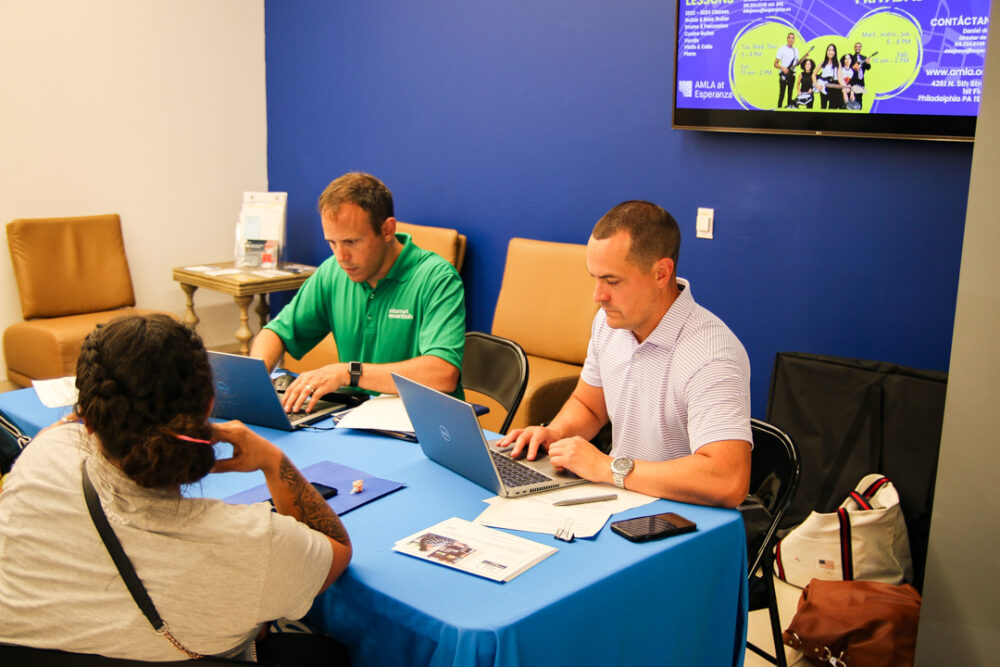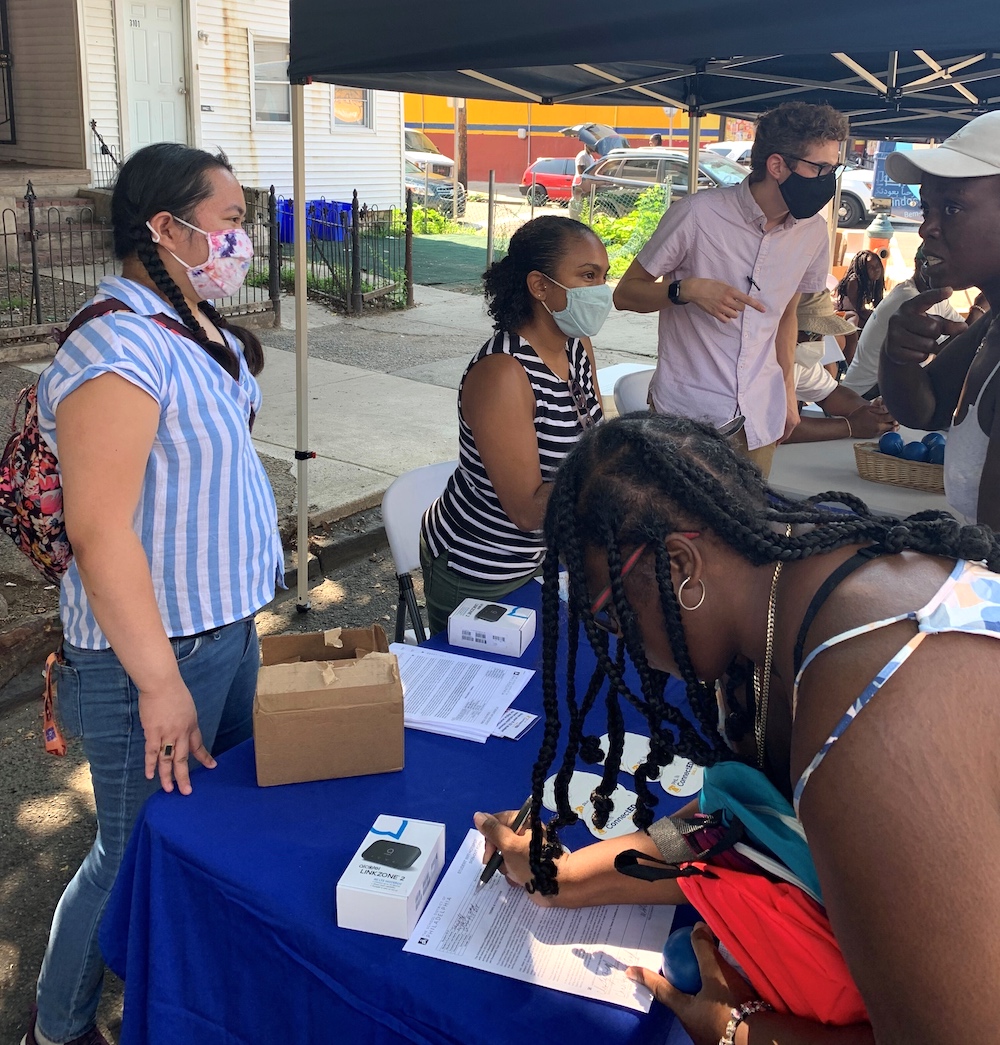At the same time the federal government is investing billions of dollars to expand broadband infrastructure, it hasn’t reinvested in a program that offers discounted internet services to low-income families.
The Affordable Connectivity Program (ACP) is a $14.2 billion federal benefits program that makes internet service more accessible to 22.5 million households in the United States. But those families could lose this resource this spring when ACP’s funds run out — if a bill that could extend it through the end of 2024 doesn’t pass.
“We’re at a point now where since Congress has not yet acted to appropriate additional funding, that the FCC has had to begin the process of winding down the program,” Kate Rivera, executive director of Philadelphia digital inclusion nonprofit Technology Learning Collaborative, told Technical.ly.
The ACP provides subsidies up to $30 per month to help eligible households pay for internet service, and up to $75 per month for households on tribal lands. It was created with a one-time funding allocation, and thus came with a deadline: Congress would need to eventually approve more money to continue the program.
Funding for the program will likely run out in April 2024. The FCC is expected to announce at the beginning of March that April will be the last fully funded month of the ACP.
The last day to enroll in the ACP is Feb. 7. Meanwhile, local institutions have leapt into action to keep residents connected to internet service.
The FCC prepares for ACP to end
For the past six months, advocates around the country have been raising awareness of the funding’s limit and reaching out to members of Congress, Rivera said. (Here’s her own plea from August.) The Biden Administration asked Congress in October to allocate $6 billion for the ACP.
What that means in practice: the FCC, Universal Service Administrative Company and internet service providers need to let customers know the program may be ending.

The deadline to send the first notification that the program is ending was on Jan. 25. The next deadline is in March, after the FCC announces the last fully funded month. This process also includes ending ACP applications and enrollment.
This timeline gives enrollees time to plan how they might adjust their internet budget or connectivity plan. If Congress appropriates more funding within the next few months, the wind-down process will stop.
This is a confusing time to discuss the ACP, Rivera said, because advocates want people to be prepared if the program does end — yet it still has a few months of funding.
“Our big message right now is, don’t panic,” Rivera said. “Don’t make any changes now to your internet service. … We’re encouraging folks to reach out to Congress. Reach out to their congresspeople and let them know that this program is important to them, and they would like to see it continue.”
How local institutions are preparing for the wind down
Local government and internet service providers have already started preparing Philadelphians in the case that ACP ends.
The City of Philadelphia, for instance, is working with partner organizations to plan outreach and potential policy responses about ACP updates.
That includes tracking information from the FCC, communicating with internet service providers for details about their wind-down plans, and gathering data from the community resources corps members and digital navigators about their experiences, said Ashley Pollard, digital inclusion manager for the Office of Innovation and Technology (OIT).
Digital navigators were heavily involved in the City’s effort to register residents for the ACP. If the program ends, they will continue to connect Philadelphians with available resources and alternative low-cost internet options, per Pollard.
“If ACP funding expires, we suspect they’ll also support clients with navigating making service changes to decrease their monthly bill, potentially changing providers to find the best option for their household,” Pollard said.

Both Comcast and Verizon, two of the largest internet service providers in the United States, offer options for lower-cost internet plans. Comcast’s 13-year-old Internet Essentials program provides connectivity for $9.95 per month.
Comcast emailed customers in January informing them that if the ACP ends, the discount will be removed from their account and they’ll be responsible for their full internet bill. The email clarified customers don’t need to do anything right now and shared details about the Internet Essentials plan.
If ACP ends, Verizon will continue to offer ACP-eligible households with up to a $20 discount for internet through the Verizon Forward program, according to a spokesperson. Verizon will also continue its Lifeline program, which offers discounted phone and internet service to low-income households.
The company supports the continuation of ACP and will keep having conversations with government leaders about the importance of the program, according to the spokesperson.
ACP Extension Act could keep the program going — but it’s only a temporary fix
There’s a chance the wind down won’t be needed: The bipartisan ACP Extension Act, introduced in both the Senate and House of Representatives in January, would allocate $7 billion to extend the program.
“The good news about ACP is that it does have really broad support across the country in urban, suburban and rural areas,” said Rivera, of the Technology Learning Collaborative.
Digital equity advocates are hopeful Congress will allocate more funding, she said, but it’s hard to predict what will happen, even with a program that has widespread support.
This bill would provide enough funding to extend the ACP through the end of the year, but it is not a long-term solution. Some Congress members and digital equity advocates are discussing how to create a long-term program that doesn’t require an extension bill every year, Rivera said.
Affordability is especially timely because the federal government is currently investing billions in infrastructure through the Broadband Equity Access and Deployment (BEAD) program.
“It would really hobble the effectiveness of the BEAD program to have states across the country, laying out new broadband infrastructure to help get more people connected and then after they’ve put in all the time and effort to create the infrastructure, people can’t actually afford the service,” Rivera said.

The National Digital Inclusion Alliance and the American Civil Liberties Union are both sharing tools to advocate for the ACP Extension Act.
Comcast is also putting effort behind the extension. The Philadelphia-headquartered communications giant recently published a blog post from Broderick Johnson, EVP for public policy and EVP for digital equity, about the value of the program.
“We’ll continue to urge Congress … and the White House to renew ACP funding,” Comcast’s Joel Shadle, executive director of corporate communications for connectivity, told Technical.ly, “because we want to keep these important resources available to the millions of consumers across the country who are using it, and that need it to stay connected to the internet.”
Philly OIT recently signed an endorsement for the ACP Extension Act, and Pollard and Juliet Fink-Yates, the department’s broadband infrastructure and digital inclusion manager, co-authored an op-ed in the Inquirer this fall advocating for the program.
Since the extension act is only a temporary fix, Pollard said OIT is also in favor of a long-term solution to continue providing funding for the ACP.
“A future without ACP will be devastating for Philadelphia households,” Pollard said. “As we know, the internet is not a luxury, it is required for most daily tasks from attending an RCO meeting, to submitting a job application, to determining the best routes on public transit. The digital divide is an equity issue that if not eradicated will exacerbate existing inequities impacting health, education, quality of life, and democracy.”
Disclosure: Comcast and Verizon are Technical.ly clients. Those relationships had no effect on this report.







